Over 30 years of anarchist writing from Ireland listed under hundreds of topics
Opinion
Two Irelands: the case of Roscommon Hospital
THERE ARE TWO IRELANDS – reality for people like you and me; fantasy for the rich and their political servants.
Frank Feighan lives in fantasy Ireland. He was elected TD for Roscommon/South Leitrim in 2011 on the basis of a pledge not to downgrade Roscommon Hospital. Enda Kenny even made a speech in Roscommon town promising to keep the hospital at its current capacity [1]. Once elected, Feighan and Fine Gael broke their promises in order to support the global financial system and to open up Ireland’s welfare services to retrenchment and privatisation. Roscommon County Hospital was downgraded in 2011, losing its 24-hour accident and emergency service. Local people reacted angrily to this betrayal, occupying the hospital for a number of days, organising local demonstrations in the town and a national demonstration outside the Dáil. Neighbours generally shunned Feighan in his constituency, painting slogans like ‘traitor’ on bales of hay on the roads leading to his home.
Syriza are not the limits of our dreams
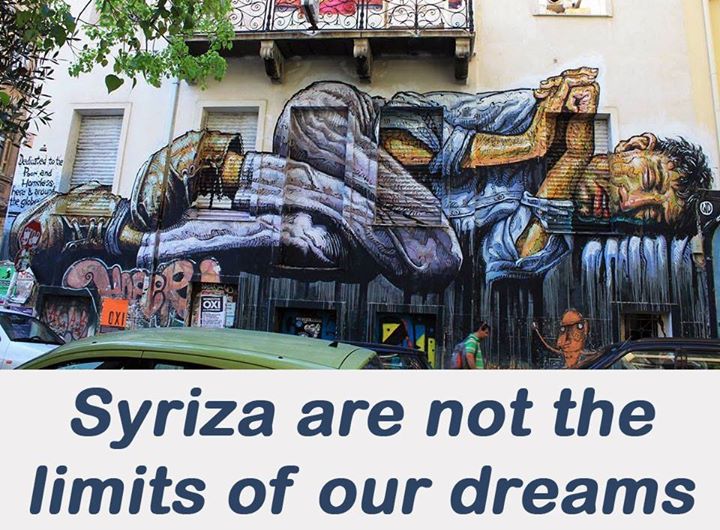 Austerity was never going to be defeated by the vote. We don't live in an economic democracy, we live in an economic dictatorship where only those with vast wealth determine its course. Parliament provides a useful illusion, one that limits our dreams and stops us acting to make them a reality. The real defeat in Greece will not be the capitulation of Syriza but rather if that capitulation is broadly accepted as the end of the road of struggle.
Austerity was never going to be defeated by the vote. We don't live in an economic democracy, we live in an economic dictatorship where only those with vast wealth determine its course. Parliament provides a useful illusion, one that limits our dreams and stops us acting to make them a reality. The real defeat in Greece will not be the capitulation of Syriza but rather if that capitulation is broadly accepted as the end of the road of struggle.
On the Greek online funding campaign - lets not neo-liberalise solidarity
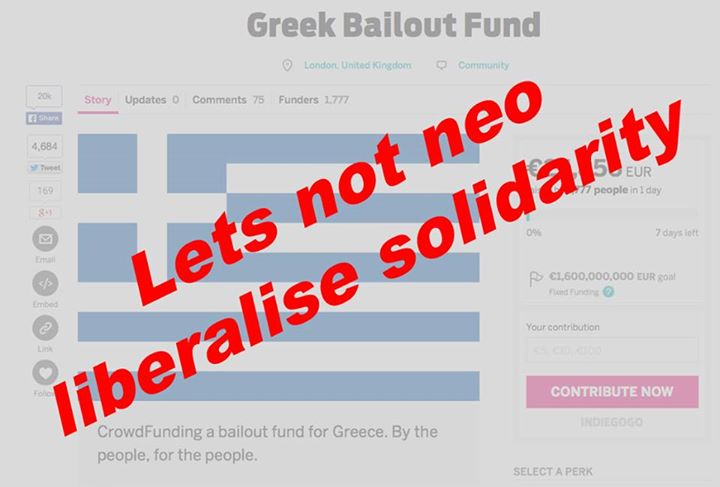 The ideas of each age tend to become that of the ruling ideology and we are seeing an extraordinary example of that at the moment. As a response the ECB/IMF attack on Greek democracy an online fund it campaign has been set up to fund the 1.6 billion interest owed and so far 1,863 people have contributed.
The ideas of each age tend to become that of the ruling ideology and we are seeing an extraordinary example of that at the moment. As a response the ECB/IMF attack on Greek democracy an online fund it campaign has been set up to fund the 1.6 billion interest owed and so far 1,863 people have contributed.
The first problem is the obvious practical one that the 1.6 billion if raised only represents the latest interest instalment on an unplayable debt over 300 billion. So even if successful such a project would only kick the ball down the road for a month or two.
The true colours of Loyalism
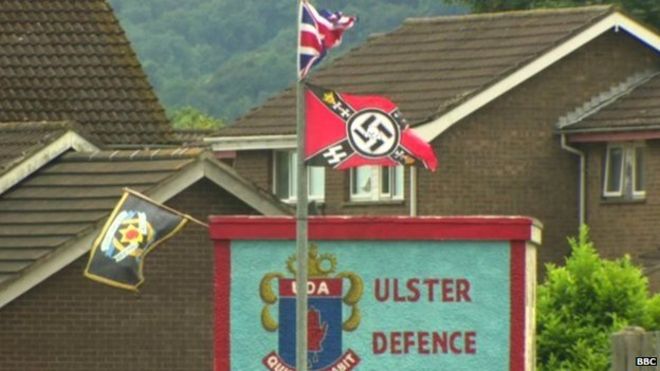 The removal of Confederate and Nazi Flags at loyalist bonfire site in Carrickfergus by local community workers is a positive step forward but this should not detract from a political settlement that rests on accommodating and institutionalizing the most reactionary elements in Northern Ireland, rather than seeking to uproot and transcend sectarian division in this mini colonial statelet.
The removal of Confederate and Nazi Flags at loyalist bonfire site in Carrickfergus by local community workers is a positive step forward but this should not detract from a political settlement that rests on accommodating and institutionalizing the most reactionary elements in Northern Ireland, rather than seeking to uproot and transcend sectarian division in this mini colonial statelet.
As the clock ticks towards the annual Orange Order 12th of July marches, the sectarian marking of territory is underway as working class communities across the North are besieged with Loyalist emblems and paramilitary flags, indirectly facilitated by the PSNI who have turned a blind eye to this showcase of sectarian triumphalism and intimidation towards anyone who is perceived as the ‘other’ from Catholics to ethnic minorities.
Clery's: The Case for Occupation
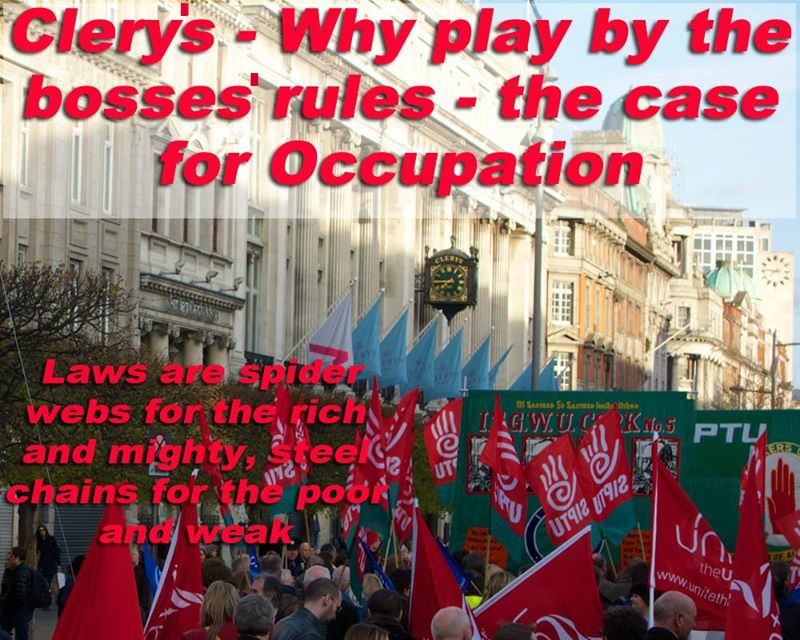 Fridays shock closure of the iconic Clery’s department store in Dublin shows how the law is set up to favour capital and screw workers. Workers are being told there may be no additional redundancy or owed holiday payments as the company is in debt. But this is only the case because right before the closure the largest asset, the building itself, was separated off from the accumulated debts. This was almost certainly legal under our system but of such obvious dubious morality that the workers could expect massive popular support if they occupied the building on a permanent ongoing basis.
Fridays shock closure of the iconic Clery’s department store in Dublin shows how the law is set up to favour capital and screw workers. Workers are being told there may be no additional redundancy or owed holiday payments as the company is in debt. But this is only the case because right before the closure the largest asset, the building itself, was separated off from the accumulated debts. This was almost certainly legal under our system but of such obvious dubious morality that the workers could expect massive popular support if they occupied the building on a permanent ongoing basis.
According to SIPTU unions organisers some of the workers are owned “four or five weeks’ wages” and the limited redundancy they will get will come not from the company but from the rest of us via the government’s insolvency and social insurance fund which pays out statutory redundancy when companies declare bankruptcy. In other words all those costs are to paid by us.
British Collusion with Loyalist Murder Gangs in the North of Ireland
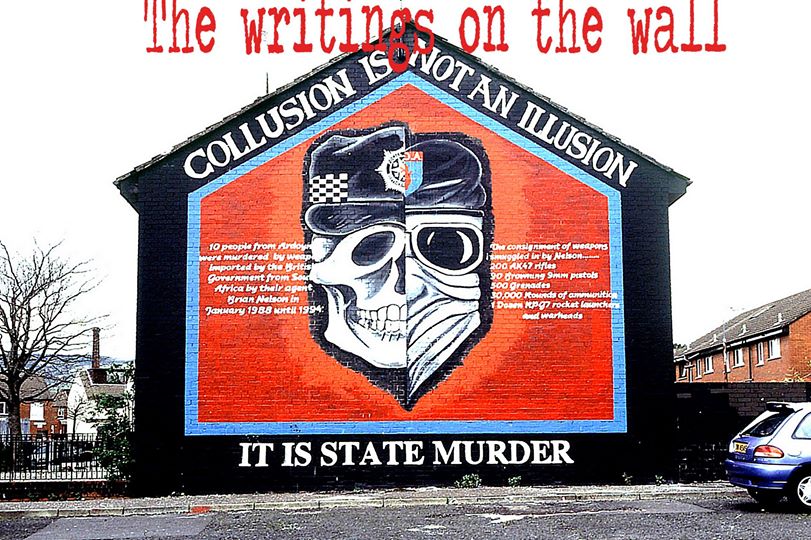 Tomorrow on RTE at 9.30pm there will be a showing of a new documentary that will focus on British government collusion in the north. The documentary makers conducted interviews with many high profile members of British policing in the north from over the last three decades.
Tomorrow on RTE at 9.30pm there will be a showing of a new documentary that will focus on British government collusion in the north. The documentary makers conducted interviews with many high profile members of British policing in the north from over the last three decades.
One such witness, a high ranking RUC officer, brought up the issue of paramilitary collusion personally with Margaret Thatcher, the British prime minister at the time, but the RUC officers concerns were ignored.
The head of special branch at the time, Raymond White said he got message from the British Government on the use of agents in the dirty war, “carry on just don’t get caught”. There are also claims from a member of the loyalist gang that was responsible for the Dublin and Monaghan bombings that the intention of the bombings was to foment civil war in Ireland.
The Real Social Cost of the Rich's Debt Write-Offs
 The vast sums of our money that the state gave to Denis O’Brien are hard to understand. None of us are ever likely to see one million, short of winning the lotto, never mind 336 million, the amount written-off when O’Brien acquired Siteserv Group, Topaz Group and Beacon Private Hospital.
The vast sums of our money that the state gave to Denis O’Brien are hard to understand. None of us are ever likely to see one million, short of winning the lotto, never mind 336 million, the amount written-off when O’Brien acquired Siteserv Group, Topaz Group and Beacon Private Hospital.
But here is a comparison that helps put the real cost in context. It’s been reported this week that a number of rape crisis centres may have to close because of escalating cash difficulties. These are caused by the loss of €240,000 in core funding. The state funding body Tusla explicitly claimed that the cuts had to happen in order to to make the best use of limited resources.
The three debt write-offs the O’Brien companies got are the equivalent of 1,400 years worth of that core funding. If Catherine Murphy’s Dáil allegation about the preferential interest 1.25% rate he was given are correct then that cost us 30 millions a year, which is around 125 years core funding for every year the loan is not repaid in interest terms alone.
Sinn Féin, Welfare Reform, and Building a Culture of Resistance
 As our bankrupt local political class squabble over the crumbs from Westminster’s table, the class war continues with the re-packaged ‘Welfare Reform’ bill - a further erosion in the standard of living of the vast majority while transferring wealth to the small minority. Don’t be fooled by token opposition from mainly nationalist political parties to oppose the bill, particularly from Sinn Féin, that they are ‘defending the most vulnerable in our society’ because they are part of the problem rather than the solution proving that the parliamentary route ends in disempowerment, corruption and betrayal. Rather than ‘defending the most vulnerable’, let’s remember their record in power from consistently rolling out the red carpet to representatives of Imperialism at home and abroad, to their rolling out of the red carpet to the Queen and Commander in Chief of the Parachute Regiment Prince Charles, to their support for tax cuts for the rich, cuts to education and healthcare, opposition to women’s right to choose, to the criminalisation of republican prisoners over the last decade.
As our bankrupt local political class squabble over the crumbs from Westminster’s table, the class war continues with the re-packaged ‘Welfare Reform’ bill - a further erosion in the standard of living of the vast majority while transferring wealth to the small minority. Don’t be fooled by token opposition from mainly nationalist political parties to oppose the bill, particularly from Sinn Féin, that they are ‘defending the most vulnerable in our society’ because they are part of the problem rather than the solution proving that the parliamentary route ends in disempowerment, corruption and betrayal. Rather than ‘defending the most vulnerable’, let’s remember their record in power from consistently rolling out the red carpet to representatives of Imperialism at home and abroad, to their rolling out of the red carpet to the Queen and Commander in Chief of the Parachute Regiment Prince Charles, to their support for tax cuts for the rich, cuts to education and healthcare, opposition to women’s right to choose, to the criminalisation of republican prisoners over the last decade.
Voting Yes for Marriage Equality
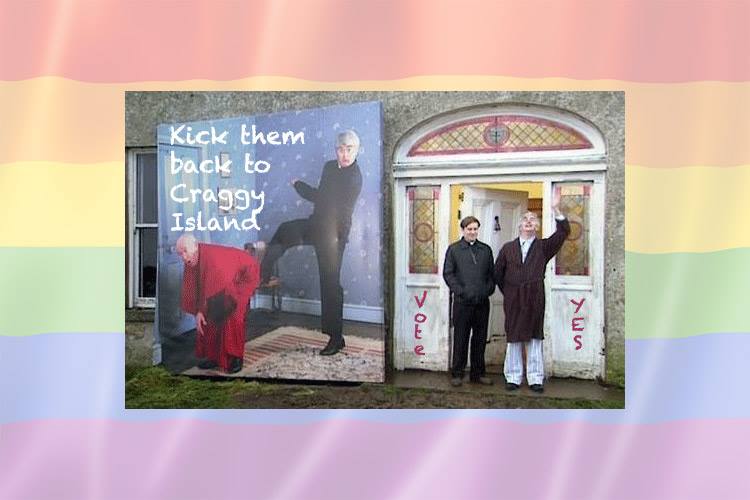 Marriage as an institution has no great appeal for anarchists. Its primary role in capitalist society is to regulate property ‘rights’ and to promote social norms. But we also know that in our current society marriage has a social standing to which many people aspire. To tell a significant section of the population that they should be denied access to marriage is to ask them to accept a secondclass position vis a vis their straight family members, workmates and friends.
Marriage as an institution has no great appeal for anarchists. Its primary role in capitalist society is to regulate property ‘rights’ and to promote social norms. But we also know that in our current society marriage has a social standing to which many people aspire. To tell a significant section of the population that they should be denied access to marriage is to ask them to accept a secondclass position vis a vis their straight family members, workmates and friends.
Striking Bus Drivers or Climate Warriors? Notes on Ireland’s Eco-Transport Struggles
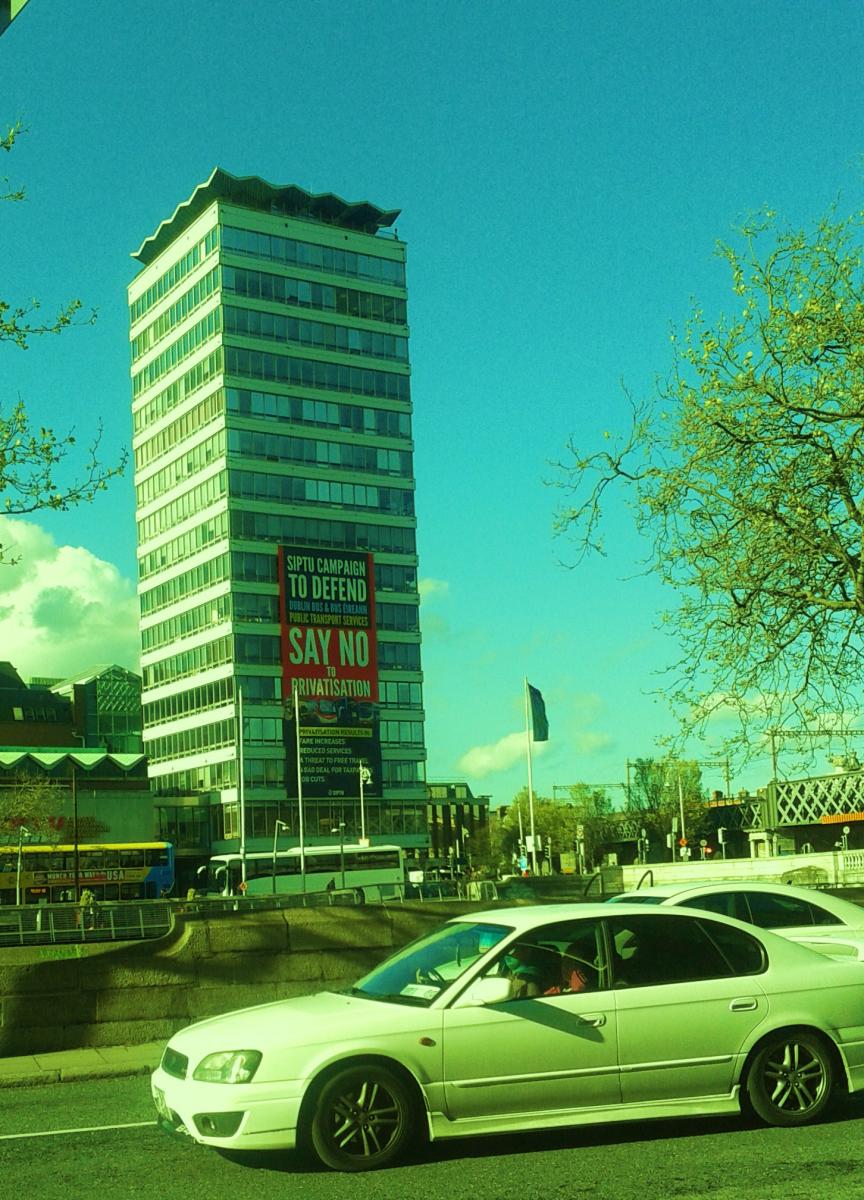 Could climate change become a catalysing force for radical social transformation in Ireland? Recent struggles around public transport in Ireland prompted me to think along these lines. Last weekend, Dublin Bus and Bus Éireann workers went on strike over plans by the National Transport Authority to tender out 10% of public routes to private operators. A few days earlier, SIPTU’s banner at Liberty Hall had been unfurled to state: ‘Say No to Privatisation; privatisation results in fare increase, reduced services, a threat to free travel, a bad deal for taxpayers and job cuts’. SIPTU and NBRU members and strike organisers have emphasised the damage privatisation will do to society, primarily concentrating on the loss of community services and the race to the bottom in bus drivers’ terms and conditions [1]. The striking workers deserve our support and their claims should be taken seriously. This is definitely the case when the regime media adhere to a deeply unimaginative line, loudly declaiming traffic disruption to an imagined city of angry consumers and silently accepting the hollowing out of public services [2]. At the same time, however, we also need to think about what’s not being said, about the words that don’t make it on to the papers or the banner.
Could climate change become a catalysing force for radical social transformation in Ireland? Recent struggles around public transport in Ireland prompted me to think along these lines. Last weekend, Dublin Bus and Bus Éireann workers went on strike over plans by the National Transport Authority to tender out 10% of public routes to private operators. A few days earlier, SIPTU’s banner at Liberty Hall had been unfurled to state: ‘Say No to Privatisation; privatisation results in fare increase, reduced services, a threat to free travel, a bad deal for taxpayers and job cuts’. SIPTU and NBRU members and strike organisers have emphasised the damage privatisation will do to society, primarily concentrating on the loss of community services and the race to the bottom in bus drivers’ terms and conditions [1]. The striking workers deserve our support and their claims should be taken seriously. This is definitely the case when the regime media adhere to a deeply unimaginative line, loudly declaiming traffic disruption to an imagined city of angry consumers and silently accepting the hollowing out of public services [2]. At the same time, however, we also need to think about what’s not being said, about the words that don’t make it on to the papers or the banner.

